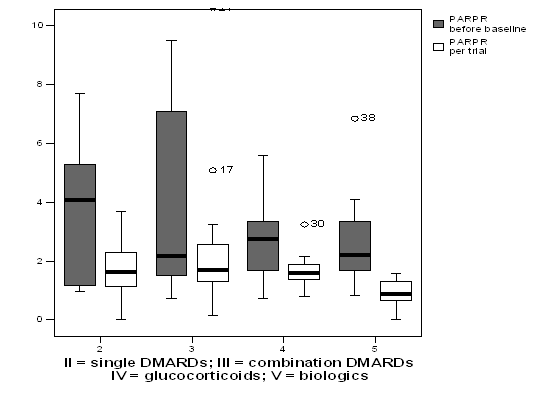Session Information
Session Type: Abstract Submissions (ACR)
Background/Purpose : A previous meta-analysis by Graudal and Jürgens (Arthritis Rheum. 2010;62:2852–63) challenged the belief that biologics better protect rheumatoid arthritis (RA) from joint destruction than DMARDs or glucocorticoids. Destruction rates had been expressed as percentages of the maximal scores and annualized. We aimed to re-analyse this work and: 1-seek for differences in baseline radiologic scores, and mean progression of destruction rates since the onset of RA, according to the subset of drug tested (DMARD, combination of DMARDS, glucocorticoids, biologics); 2-compare destruction rates since RA onset and during the period of the trial, both in the verum arms and placebo arms.
Methods: All studies from groups II to V of this meta-analysis were retrieved and re-analysed by two independent readers. Destruction rates could be calculated both since RA onset and per-trials in 41/55 studies (41 verum arms, and 43 control arms).
Results: Baseline scores were higher in patients from biologic trials, but duration of RA was also longer. Consequently, destruction rates before baseline were even lower in biologic trials. In absolute values, difference between verum and controls were not superior in trials of biologics, but when expressed as % of reduction as compared to per-trial destruction rates in the control arms, biologics seemed more efficient (71% +/ 19, median: 78%), than DMARDs (52% +/- 41, median: 64%) and glucocorticoids (52% +/- 22, median: 48%). The per-trial mean destruction rates were (much) lower than the mean destruction rates since RA onset in the four groups, even in the placebo arms, especially in biologic trials. Only placebo arms appear in the figure below. Boxplots represent median, lower and upper quartile, and 95th percentiles.
Conclusion: 1-The difference of per-trial radiographic progression might have biased the results of the previous meta-analysis. When expressed as ratio of destruction rates between verum and control arms, biologics performed better, although DMARDS and glucocorticoids were also clearly effective; 2-‘expected worsening’ as a substitute for placebo arms is inappropriate, and should be banned.
Disclosure:
J. M. Berthelot,
None;
C. Cozic,
None.
« Back to 2012 ACR/ARHP Annual Meeting
ACR Meeting Abstracts - https://acrabstracts.org/abstract/the-annualized-progression-of-radiologic-damage-in-placebo-arms-of-rheumatoid-arthritis-trials-is-much-lower-than-the-mean-annual-progression-since-disease-onset/

